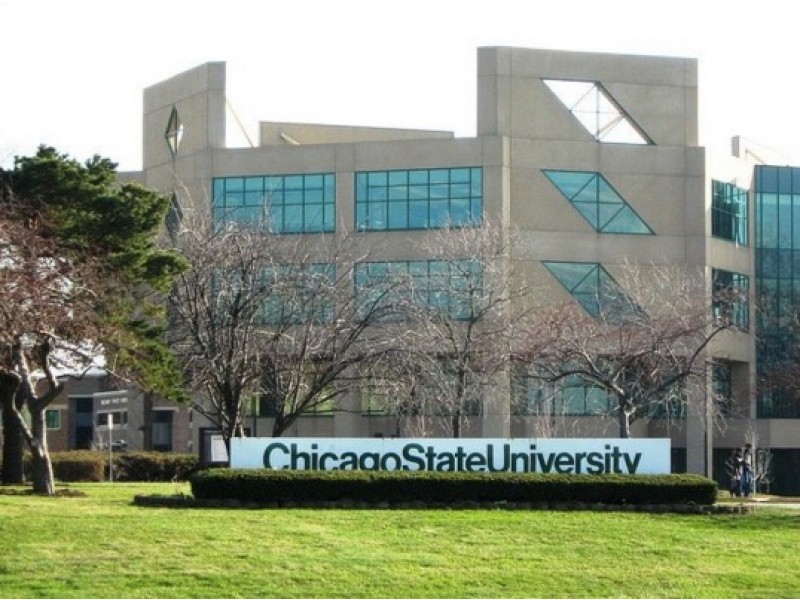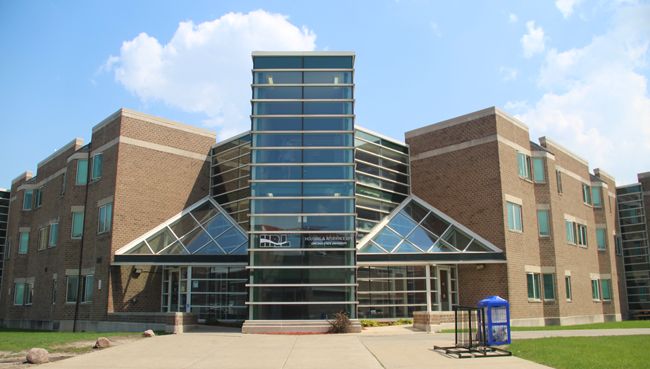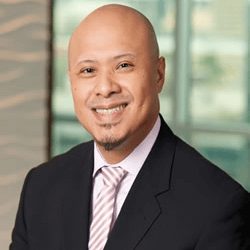
Mr. Roosevelt Martin, Jr. is the Assistant Dean of the College of Business at Chicago State University in Chicago, Illinois. Dean Martin is an educator, administrator, and thought leader in higher education and business. He is married with children and has many interests and hobbies.
Prior to becoming the assistant dean in the College of Business in July 2017, Mr. Martin served in a myriad of positions within the college starting August 2001. The positions and experience ranged from the Director of the Greater Southside Entrepreneurship Center to the Director of Student Affairs where he excelled. His commitment to excellence has led to numerous awards such as the Outstanding Leadership in Business Award in July 2008 and The Most Distinguished Man in Illinois Award in June 2016. He continues to teach courses annually on special topics in management, promotes access to affordable education, as well as conducts research on the exploration of social engagement in the workplace.
His engagement in the business community is wide ranging, as he has more than three decades of management experience and sits on the board of directors for Strengthening A Nation (SAN), the McGraw Hill Editorial Advisory Board, along with a host of others.
1. How did you get started in this line of work? How long have you been with your university?
Upon graduating from Roosevelt University in May 1997, I was immediately offered an adjunct position to teach a course in Management Information Systems in their MBA Program, which I graciously accepted. This later led to a number of other opportunities that include, University of Phoenix, Northeastern Illinois University and finally Chicago State University where I met my mentor, Dr. Eldridge T. Freeman, Jr. who gave me my start in August 2001. He told me to whom much is given much is required. These were words to live by and would later change my life.
2. How have you prepared for your administrative career in higher education?
I came out of the Management Arena in 2001, where in my last position I turned around a slumping automotive part manufacturer and realized it was time to give back. Initially, I taught as a substitute in an urban school district where I could make an immediate impact on the K-12 children which I viewed as our future. As a substitute teacher, I was bitten by the education bug and moved on to higher education at Chicago State University as an adjunct professor in the College of Business. My love for teaching led me to become the Director of the Greater Southside Entrepreneurship Center within the College of Business at Chicago State University. During the time in this position, the dean recognized my zeal and thirst for change and elevated me to the Office of the Dean. It was there that I was able to hone my hidden talents and begin to showcase them to the world. This has been my journey to my current role as Assistant Dean and each position has been valuable for my administrative career.
3. Business is constantly changing, what types of things is your school doing to make sure students are learning the most updated business information?
We constantly examine the industry and know that the world is a smaller place. Therefore, we must prepare our students to become strong, global citizens with the ability to navigate diverse environments. In doing this, we have created internships both inside and outside the United States and exposed our students to cultural diversity. We have forged partnerships with industry leaders and listened closely to what they have to say to ensure the rigor of our program. This has led to the creation of a MBA Program slated to start in January 2019. We review and update our strategic plan every five (5) years and review the undergraduate and graduate programs for relevancy

4. How does your work serve your institution’s student and faculty population?
As the Assistant Dean, I serve as a senior member of Academic Affairs leadership team and work in collaboration with the faculty, staff and students of the College of Business to ensure academic integrity and success.
My role can be described as a liaison who ensures that the appropriate measures are taken to provide the tools needed to for students to succeed; from classroom innovation to a quiet place to study when students are preparing for exam. I approach my work using active learning. Here is where the rubber meets the road. As part of the active learning process, undergraduate students are encouraged to be discoverers rather than receptacles of knowledge, and consequently there is more involvement by faculty in undergraduate research and mentoring. Different modes of teaching are used to take advantage of students’ various learning styles such as hybrid courses, online courses and those in peer groups are used to disseminate information to their classmates about the value of innovation.
5. What is the most rewarding aspect of your work and what do you find to be the most challenging?
The most rewarding part of my job is seeing the graduates walk across the stage at the end of what has sometimes been a long journey and knowing that this chapter in their life has been completed. I get great joy in helping others. On the flip side, the most challenging is seeing an individual who you know in your heart has the potential to do well but failed because of a lack of effort.
6. Faculty play a critical role in the development of your student’s learning and in helping build their business competencies. What type of things are your faculty involved in and doing that makes their classroom unique to the student’s learning experience?
The faculty members of the College of Business at Chicago State University are a very diverse group of individuals representing approximately 14 countries and speak 25 different languages. They collectively have an average of 25 plus years each in the educational arena. In order to prepare business graduates for professional careers, our faculty not only encompass business topics but also subjects that deal with the specifics of the global workplace and our global society. Since CSU graduates have to interact with other members of society, adapt to societal changes, and serve as business advocates, students are encouraged to study global topics that will prepare them for these challenges in our ever changing society.

7. Are there any projects you are working on to advance your institution?
We are currently working on the following innovative projects in order to advance student outcomes:
- MOU with two leading institutions in Ghana, Africa: SHORT Management (School of Hotel Restaurant Tourism Management), Accra and UPSA (University of Professional Studies, Accra)
- Business collaboration for internships in Accra: Ghana Tourism Authority, Airport View Hotel, Paloma Hotel, Metropolitan Insurance Company, Ltd. We have a country subject matter expert to conduct workshops for our students in Ghana and lead training programs for high school students in entreprenuership.
- Offering the 1st fully online undergraduate degree in the 150 year history of Chicago State University
- Launching of an Executive MBA Program
8. What type of qualifications and experiences does your faculty bring to the class? How do you make sure they stay updated in their area of expertise and field of study?
All of our faculty have terminal degrees and/or many years of experience in their subject areas. CSU Faculty ae also actively involved in professional activities that enhance the depth and scope of their knowledge and are subject matter experts. They are also required to participate in scholarly works such as research, publications, professional conferences, and workshops.
9. Business and entrepreneurship education are still in high demand, but the competition is larger than ever. How does your degree program differ from other schools?
Our mission has entrepreneurship, leadership, and social justice in it. Our program supports the mission and each course is designed to approach business from a traditional as well as non-traditional perspective. Over 40% of our students are working adults and evening students, so we pride ourselves in providing access to all students. In addition, Chicago State University is one of the lowest options for tuition and fees among all the four-year public universities in Illinois. We are conveniently located in an urban setting and accessible to public transportation. CSU also has 65 diverse and relevant academic majors and 17 certificate programs and the class sizes are small so we get to know our students. We offer the minor in entrepreneurship so students from other majors can take advantage of these courses to support their careers. The faculty and staff are committed to preparing diverse, thought leaders in a global world.
10. In closing, are there other information you want to share with our readers about your university or programs that we have not touched on?
Chicago State University will celebrate its sesquicentennial in 2017. Chicago State University opened its doors as a teacher training school in a leaky railroad freight car in Blue Island, Illinois on September 2, 1867. Today, in contrast, the university is a fully accredited public, urban institution located on 161-picturesque acres in a residential community on the Southside of Chicago. During the first year of its founding, CSU enrolled 62 students. The current student enrollment is nearly 4,000.
Today, CSU is governed by a Board of Trustees appointed by the Governor of Illinois. The university’s five colleges- Health Sciences, Arts and Science, Business, Education, and Pharmacy – offer 38 undergraduate and 30 graduate degree-granting programs. In addition, CSU has a Division of Continuing Education and Non-Traditional Programs that reach out to the community with extension courses, distance learning and not-for-credit programs.
From its humble origins, Chicago State University has evolved into an outstanding, nationally acclaimed university that provides a value-added education for all who enter its hallowed halls. Consistently evolving to reflect state-of-the-art trends in higher education, Chicago State University prepares students for success in the twenty-first century.
The mission of the College of Business, in keeping with the University’s mission, is to promote quality undergraduate education that is learner-centered and technologically responsive to a culturally and economically diverse student population. Through its programs, the College is committed to developing students by:
- Providing foundations in business for students who have the ability to, and desire to, learn.
- Producing graduates who are responsible, discerning, ethical and informed citizens with a commitment to lifelong learning, business leadership, entrepreneurship, and service.
- Fostering a collegial environment, which values the personal growth and academic success of individuals through its teaching, research, service and entrepreneurial initiatives.
- Supporting other university academic programs by providing basic business instruction to enrich the curricula.

Dr. Emad Rahim is an award-winning entrepreneur, educator, author, community leader and TEDx Speaker. He currently serve as the Endowed Entrepreneur-in-Residence at Oklahoma State University and teaches at the Jack Welch Management Institute in the Executive MBA program. He was recognized by the United Nations Foundation as a 2013 Empact100 Honoree for his social entrepreneurship work, received a Congressional Award for his community service and was the recipient of the Forty Under 40 Business Leadership Award sponsored by Syracuse University. His personal story was turned into a short documentary, “Against the Odds,” and featured in the Huffington Post and Forbes. He co-authored “Leading Through Diversity: Transforming Managers Into Effective Leaders” and “The 4-Tions: Your Guide to Developing Successful Job Search Strategies” and is a frequent contributor to the Refractive Thinker book series, CEO Magazine, TweakYourBiz and YFS Entrepreneurship Magazine. Fellow him on Twitter @DrEmadRahim











